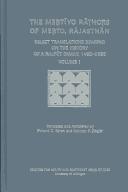| Listing 1 - 5 of 5 |
Sort by
|

ISBN: 0891480854 0472901737 9780472127771 9780472901739 Year: 2020 Publisher: Baltimore, Maryland : Project Muse,
Abstract | Keywords | Export | Availability | Bookmark
 Loading...
Loading...Choose an application
- Reference Manager
- EndNote
- RefWorks (Direct export to RefWorks)
This book is a treasure for scholars of Rajput history. Richard D. Saran and Norman P. Ziegler, whose contributions to Rajput studies are well known to specialists in the field, have given us a work of deep and exacting scholarship. It is the culmination of decades devoted to the study of Middle Marwari chronicles from Rajasthan. The sources translated here provide access to the fortunes of a branch of the Jodhpur royal family, and in doing so they illuminate the larger world of Rajputs in the middle period. The translations are accompanied by an extensive explanatory apparatus taking various forms, which includes a valuable essay on Rajput social organization, complete genealogies, and biographies of all the major personages of the chronicles.
Rajput (Indic people) --- History. --- Rajasthan (India) --- Rajasthan (Indic people) --- Rajasthani (Indic people) --- Rajpoot (Indic people) --- Rajputs --- Ethnology
Book
ISBN: 0472127772 Year: 2001 Publisher: Ann Arbor, Michigan : University of Michigan Press,
Abstract | Keywords | Export | Availability | Bookmark
 Loading...
Loading...Choose an application
- Reference Manager
- EndNote
- RefWorks (Direct export to RefWorks)
Rajput (Indic people) --- History. --- Rajasthan (India) --- Rajasthan (Indic people) --- Rajasthani (Indic people) --- Rajpoot (Indic people) --- Rajputs --- Ethnology
Book
ISBN: 9048536758 946298560X Year: 2019 Publisher: Amsterdam Amsterdam University Press
Abstract | Keywords | Export | Availability | Bookmark
 Loading...
Loading...Choose an application
- Reference Manager
- EndNote
- RefWorks (Direct export to RefWorks)
This book explores the modern transformation of state and society in the Indian Himalaya. Centred on three Rajput-led kingdoms during the transition to British rule (c. 1790-1840) and their interconnected histories, it demonstrates how border making practices engendered a modern reading of 'tradition' that informs communal identities to date. By revising the history of these mountain kings on the basis of extensive archival, textual, and ethnographic research, it offers an alternative to popular and scholarly discourses that grew with the rise of colonial knowledge. This revision ultimately points to the important contribution of borderland spaces to the fabrication of group identities.
Book
ISBN: 1282602977 9786612602979 9047429389 9789047429388 9781282602977 9789004175945 9004175946 Year: 2009 Publisher: Leiden Boston Brill
Abstract | Keywords | Export | Availability | Bookmark
 Loading...
Loading...Choose an application
- Reference Manager
- EndNote
- RefWorks (Direct export to RefWorks)
James Tod’s Annals and Antiquities of Rajasthan was crucial in forming the modern image of the Rājpūt, a princely “martial” caste resident in India’s northwest desert. This book explores the relationships between the political power of the British imperial state, the construction of historical memories in the late nineteenth and early twentieth centuries, and the uses of these constructions by European writers and Indian nationalist elites. The case of the Rajputs demonstrates how imperial histories reflected Indian social processes and pre-colonial forms of knowledge, interpreted India for the world outside and for Indians themselves. This book explores the multiple discourses within Tod’s Rajasthan, and European Orientalism, to show how intricately coded the British Empire was and, historically, remains.
Rajput (Indic people) --- Rajasthan (Indic people) --- Rajasthani (Indic people) --- Rajpoot (Indic people) --- Rajputs --- Ethnology --- Historiography. --- History. --- Tod, James, --- India --- Rajasthan (India) --- History --- Radzhastkhan (India) --- Rajwara (India) --- Rājasthāna (India) --- Rajastan (India) --- Раджастхан (India) --- Rajputana (Agency) --- Rayastán (India) --- 拉贾斯坦邦 (India) --- Lajiasitanbang (India) --- State of Rājasthān (India)

ISBN: 1282069926 9786612069925 0226340554 9780226340555 9780226340500 0226340503 0226340503 0226340511 9780226340517 9781282069923 6612069929 Year: 1999 Publisher: Chicago University of Chicago Press
Abstract | Keywords | Export | Availability | Bookmark
 Loading...
Loading...Choose an application
- Reference Manager
- EndNote
- RefWorks (Direct export to RefWorks)
Throughout India and Southeast Asia, ancient classical epics-the Mahabharata and the Ramayana-continue to exert considerable cultural influence. Rethinking India's Oral and Classical Epics offers an unprecedented exploration into South Asia's regional epic traditions. Using his own fieldwork as a starting point, Alf Hiltebeitel analyzes how the oral tradition of the south Indian cult of the goddess Draupadi and five regional martial oral epics compare with one another and tie in with the Sanskrit epics. Drawing on literary theory and cultural studies, he reveals the shared subtexts of the Draupadi cult Mahabharata and the five oral epics, and shows how the traditional plots are twisted and classical characters reshaped to reflect local history and religion. In doing so, Hiltebeitel sheds new light on the intertwining oral traditions of medieval Rajput military culture, Dalits ("former Untouchables"), and Muslims. Breathtaking in scope, this work is indispensable for those seeking a deeper understanding of South Asia's Hindu and Muslim traditions. This work is the third volume in Hiltebeitel's study of the Draupadi cult. Other volumes include Mythologies: From Gingee to Kuruksetra (Volume One), On Hindu Ritual and the Goddess (Volume Two), and Rethinking the Mahabharata (Volume Four).
Rajput (Indic people) --- Dalits --- Hinduism --- Islam --- Depressed classes (South Asia) --- Harijans --- Scheduled castes (India) --- Untouchables --- Caste --- Ethnology --- Rajasthan (Indic people) --- Rajasthani (Indic people) --- Rajpoot (Indic people) --- Rajputs --- Religious life. --- Religion. --- Relations --- Islam. --- Hinduism. --- Draupadī --- Mahābhārata --- Makhabkharata --- Mahabarat --- Mahabarātah --- History. --- Draupadī (Hindu mythology) --- india, indian literature, literary studies, classic epics, southeast asia, mahabharata, ramayana, traditions, fieldwork, oral tradition, cult, goddess, draupadi, sanskrit, culture, local history, historical, religion, religious, military, former untouchables, muslims, hindu, dalits, hinduism, islam, mythology, mythological, real hero, deification, regionality, marriage, transformation, divine, divinity. --- Draupadī (Hindu mythological character) --- Draupadi (Hindu mythology) --- Mahabharata
| Listing 1 - 5 of 5 |
Sort by
|

 Search
Search Feedback
Feedback About UniCat
About UniCat  Help
Help News
News